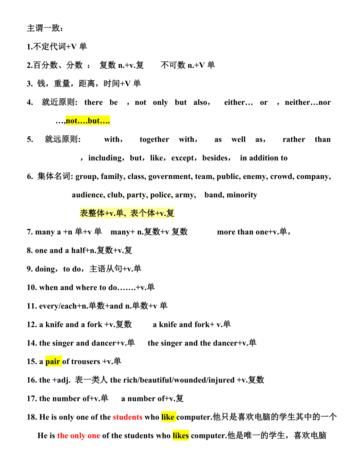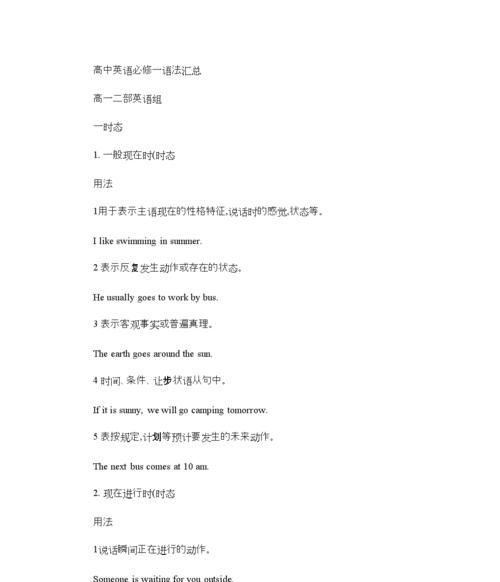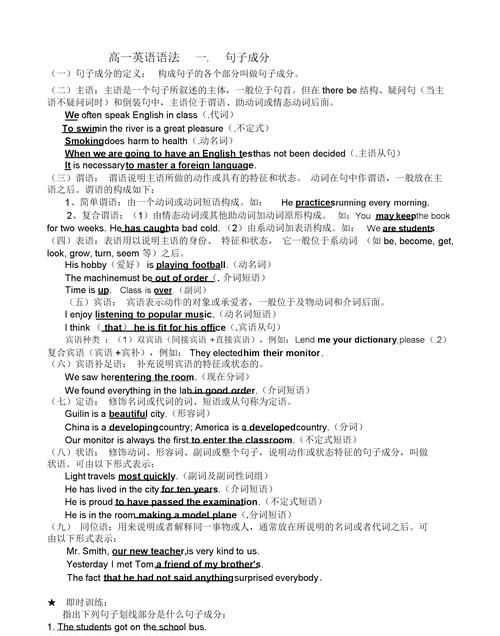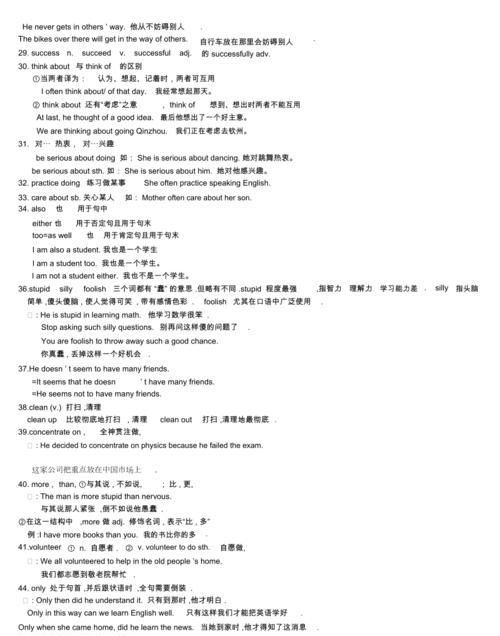本文目录
高一英语必修二知识点总结(人教版)
高一必修二英语知识点你都掌握了吗?为了方便同学们复习,接下来我为你推荐英语必修二知识点 总结 ,一起看看吧!
英语必修二知识点总结Unit3 Computers
一、重点 短语
1. in common 共同的in common with 和…一样
We have much/a lot /nothing /little /something in common.我们有很多/没有/几乎没有/有一些相似之处。
2.put… in order把…排序
in order按顺序; 整齐out of order次序紊乱;(机器等)失灵; 出故障
3. compare …with…把…与…想比
compare …to… 把…比作…
compared with与…想比
4. over time 久而久之
5.begin as作为…开始
6. technological revolution科技革命
7. from then on. 从那时起
from now on 从现在起
8. artificial intelligence 人工智能
9. in size and in brainpower 在体积和脑容量上
10.as a result结果as a result of作为…的结果
11. go by(时间)流逝,过去 pass by经过
12. human beings, human race, mankind人类
13. provide sb. with sth.= provide sth. for sb.给某人提供某物
14.be filled with充满
14. a life of high quality高质量生活
15. in reality事实上16. be crazy about…痴迷于,醉心于
17. do research into 进行…的研究
18. have a good shot for a goal. 好好地射一个球
19. a devoted friend一个忠实朋友
20. be connected with …与…有联系
21. get together 聚会
22.make up 组成,构成
be made up of由…组成;编造;弥补
make up for;化妆
23.in the early 1960s在20世纪 60 年代早期
24. on the football team在球队中
25. come true 实现,达到
My dream comes true.我梦想成真。
realize one’s dream 实现梦想
26. in a way=in one way=in some ways从某种程度上说,从某些方面来说
in the/one’s way挡路,碍事
on the/one’s way to …在去…的路上
in this way用这种 方法
by the way 顺便提一下
by way of London 途经伦敦
lose one's way 迷路, 迷失方向
in no way绝不
27. after all毕竟,终究
in all=in total总共
above all尤其重要的是,首先
first of all首先,起初
not at all根本不,一点也不
all in all 总之
28. by Oneself=on one’s own独自
29. watch over 看守,照管,监视
30.mobile phone手机
31. with the help of在…的帮助下
32. what’s more=in addition 更重要的是,而且,另外
二、重点句型
1. …it nearly took two hundred years before I was built as an analytical machine…
差不多到了200年之后我才被做成分析机。
It takes/took/be+时间段+before… “多久之后才…”
2. As time went by. 随着时间的推移。
英语必修二知识点总结Unit4 Wildlife protection
一、重点短语
1. decrease减少,降低
decrease by 减少了
decrease to减少到
increase by/to增加了/到
2. endangered animals濒临危险的动物
in danger of有…的危险;垂危
out of danger脱离危险
3. die out 逐渐消失,灭绝(某一物种,也可指疾病、语言、社会习俗custom的灭绝,消失)
die off(指一群人或动物等)相继死去
die away(声音,风,光线等)逐渐停止,逐渐消失
die down(火焰,风暴,激烈的情绪等)逐渐减弱,变小
4. in peace安详地,和平地
5. loss损失,丢失,遗失a
t a loss困惑不解;不知所措
6. in relief 如释重负
7. a nature reserve 自然保护区
a natural protection zone 自然保护区
8. be distant from…离…很远
in the distance在远处
9. be employed to work被雇来工作
10. long to do sth.渴望做某事 long for sth.想要…
12. turn around回转,转向
turn down减弱,降低;拒绝
turn up出现;露面;把声音开大
turn out关闭(煤气、自来水、电灯等);(常与to, that连用)结果
turn off 关闭,关掉
turn on 打开(煤气、自来水、电灯等)
turn to sb. for help想某人求助
13. burst into laughter=burst out laughing突然笑了起来
burst in闯进,突然插嘴
burst into tears=burst out crying突然哭起来
burst into +名词=burst out +doing突然…起来
14. without mercy惨忍地
show mercy to对…同情/怜悯,可怜
at the mercy of听由…摆布
15. a certain number of一定数量的
certain 确定的;某一、某些;一定的
16. the importance of… 。。。的重要性
be of great/much importance 非常重要
17. protect …from…保护…不受…(危害)
under the protection of在…的保护下
18. contain含有,包含;容纳;容忍 (事物在里面,或某事物由什么组成)
include包括
19. pay attention to注意(to为介词,后跟名词、代词、形容词)
Attention, please!请注意
Attract/draw/catch one’s attention 吸引某人的注意
fix one’s attention on集中注意力在…上
20. succeed in doing sth. 成功地做某事
success(n.)成功 successful(adj.)成功的
21. be concerned about对…关心
22. have a secure income有固定的收
23. hunt for寻找,搜寻
24. do harm to 伤害,对…有害
do good to对…有好处
25. come into being出现,形成
26. appreciate (v.)欣赏,感激,意识到
appreciate+名词/代词/动名词
I would appreciate it if… 如果…我将不胜感激。
27. an unexpected incident一件意外事故
28. for sure确切地,无疑地
29. according to a UN report 根据联合国的一份 报告
30. in the last 500 years 在过去500年里
31. a start and an ending开头和结尾
32. intend/mean/ plan to …打算//计划做……
33. to teach sb. a lesson教训某人
二、重点句型
Certain和sure的句型
Sb. be sure/certain of…= Sb. be sure/certain that从句 某人确信…
be sure/certain to do sth. 肯定会做…
It’s certain that从句 肯定会
例如: It’s certain that he will succeed.=He’s sure/certain to succeed.他肯定会成功的。
I’m sure/certain of his success.= I’m sure/certain that he will succeed. 我确信他会成功的。
英语必修二知识点总结Unit 5 Music
一、重点短语
1. dream of/ about 梦想,想要
2. at a concert在音乐会上
3. to be honest 老实说,说实话
3. attach v.系上,附上,附加,连接
attach … to …. 附上,连接
attach importance/value/significance/weight to认为…有重要性/价值/意义/分量(to为介词)
be attached to连在...上, 附属于;热爱, 依恋
4. form the habit of doing sth.形成…的习惯
5. give performances 演出
6. be paid in cash 得到现金
7. earn v.赚,挣得,赢
earn extra money挣外快
earn/make a/one’s living谋生
make/earn money挣钱
8. rely on/upon=depend on/upon 依靠
rely on sb. doing sth.= rely on to do sth. 指望/依靠某人做…
rely on it that从句 相信,指望…
reliable (adj.)可依赖的,可靠的
9. during the broadcasts 在播出的时候
live television broadcast实况电视广播, 现场电视广播
10. be familiar to为…所熟悉
get/be familiar with=have a good knowledge of 熟悉, 通晓, 精通
11. in addition=what’s more 另外,加之,此外
in addition to…=besides除…之外还
12. break up 解散,解体;打碎;(关系) 破碎,;分裂, 结束, 衰落,驱散;分手
break down破坏,损坏;停住运转,出故障;精神崩溃,身体垮掉;(中途)抛锚
break in插话,打断
break into 破门而入
break out突然发生,(疾病、火灾
战争等)爆发
break off 突然停止或中断说话;断裂
break away逃走,脱离出去
13. play jokes on=play a joke on耍弄,开玩笑
make fun of取笑
laugh at嘲笑
14. a year or so 大约一年
15. go away离去, 带走(with)
16. mix up搅匀(拌和,混淆,搞乱)
17. sort out分类;整理;区分;解决(问题)
sort…into…把…分类,整理
all sorts of各种各样的
18. in brief简言之,一言以蔽之
in short综上所述
to be brief简单地说
briefly(adv.)简要地
19. devotion (n.)投入,热爱
devoted(adj.) 忠实的,深爱的
devote(v.) 献身,专心于
devote oneself to献身,致力,专心于
be devoted to专心于
devote…to…把…用于/献给
20. afterwards随后,后来
forward(s) 向前 backward(s)向后
21. as soon as一…就…
22. be confident about/of/in对…有信心
23. on a brief tour 短暂的巡演
24. went wrong.出错了
25. be sensitive to对…敏感
26. come up with提出,想出(主意,计划,答案)
27. stick to 坚持,忠于,信守(原则,计划,决定,诺言,意见等)
注:to为介词
insist on坚持(建议,看法,主张等)
28. above all首先,最重要的是first of all首先,第一
29.pretend假装,伪装
pretend to be+ adj./n.假装是
pretend to do假装做
pretend to be doing假装正在做
pretend to have done假装已做过…
pretend that从句 假装…
二、重点句型
1.Sometimes they may play to passers-by in the street or subway so that they can earn some extra money for themselves or to pay for their instruments.有时他们可能在街上或地铁里为过路人演奏,这样他们可以为自己或自己要买的乐器多挣一些钱。
They were so popular that their fans formed clubs in order to get familiar with them. 他们非常走红使得歌迷们为了更加熟悉他们而成立了俱乐部。
So that“以便,为了” so…that…“如此…以致于…”
高一英语 必修二知识点总结相关 文章 :
1. 高一英语必修一必修二知识点总结
2. 必修二知识点总结
3. 高一英语必修一知识点归纳总结
4. 高一英语必修一重要知识点总结笔记
5. 高中英语知识归纳笔记
6. 高中数学必修二知识点总结
7. 高中英语知识点总结与归纳
8. 高一化学必修二知识点总结
9. 高一化学必修二知识点总结
10. 高一化学必修二知识点总结复习资料

高中英语必修二第三单元语法总结
语法一:时间状语从句
时间状语从句主要用于说明主句动词的时间,其类型颇多详见如下归纳。
1. When 引导的时间状语从句,意为“当……的时候”,when 的从句可以用延续性动词。 He was working at the table when I went in . 当我进去的时候,她正在桌旁工作。 I was watching TV when he came. 他来的时候我正在看电视。
注意:when 也可以作并列连词,表示一个动作即将或正在进行或刚完成的时候,突然发生了另一件事。
I was about to leave when the telephone rang. 我正要离开,这是电话铃响了。
We were working in the chemistry lab, when the lights went out.
我们正在化学实验室工作,突然灯熄灭了。
I had just gone to sleep when there was a knock at the door. 我刚入睡就有人敲门。
2. While 引导的时间状语从句,表示“与……同时,在……期间”。While 的从句中常用延续性动词或表示状态的词。
They rushed in while we were discussing problems. 当我们正在讨论问题时,他们冲了进来。 Father was cleaning the car while I was playing computer games.
当我正在玩电子游戏时,爸爸在清洗汽车。
注意:while 还可以表示对比意义,意为“而;却”。例如:
Jane was dressed in blue, while Mary was dressed in red.
珍妮穿着蓝色的衣服,而玛丽穿红色的。
3. As 引导的时间状语从句,作“当……的时候,一边……一边”“随着----”解,as 的从句中可使用延续性动词,也可使用非延续性动词。例如:
He sang as he was working.他一边工作一边唱歌。
As time goes by, we have a better understanding of things around us.
随着时间的推移,我们对自己周围的事务有了更好的理解。
4. Before 和 after 引导的从句:前者一边表示主句的动作发生早从句的动作之前;后者表示主句的动作发生在从句的动作之后。例如:
I didn’t know any English before I started school. 我上学之前,一点英语都不懂
I had cooked supper before my parents came back. 我父母回来之前,我就做好了晚饭。 It won’t be long before we meet again. 我们不久就能见面。
After he came out, he locked the door. 他出来后,就锁上了门。
5. Since 和 ever since 引导的从句:表示“自从……以来”,从句一般表示动作的起点,用过去时。主句表示动作延续的情况,一般用现在完成时或现在完成进行时。如果主句表示的是时间,主句可用一边现在时,也可用现在完成时。
现在完成时(延续性动词)…since+…过去时(非延续性动词)“自从……以来”
现在完成时(延续性动词)…since+…过去时 (延续性动词)“自(延续性动词结束以来……” Since he came here , he has made a lot of friends.他来这里以后,已交了许多朋友。
He has been working here ever since he left university.
自从大学毕业以后,他就一直在这里工作。
She has lived alone since her husband died.自丈夫去世后她就一直独自生活。
I have been wearing glasses since I was three.我三岁以后一直戴眼镜。
It is ten years since he smoked.他戒烟十年了。
语法二 过去完成时
1. 过去完成时由助动词had 加过去分词构成,主要表示在过去某时之前已发生的动作或情况,也可以说时“过去时间的过去”。
其被动形式为“had + been + p.p” 例如:
By the end of last term, we had learned more than 3,000 English words.
到上个学期末为止我们已经学了3000 多个单词了。
注意:如果句中出现了表示过去的具体时间状语,句子的内容可为过去的实际情况或句子中的内容为历史事实时,句中的动词时态只能用一般过去时。例如:
The teacher said that it was Columbus who first discovered the American continent.
2. 在表示某人过去未曾完成的“心愿,打算,计划,想法,许诺”等等时,hope , mean ,plan, want ,promise , intend 等位于动词必须用过去完成时。例如:
I had planned to offer you some help in your shop, but suddenly my mother fell ill yesterday. 昨天我原本计划在你的店里帮一些忙的,但是我妈妈突然病了。
He had hoped to spend the important day with us last Sunday , but he was too busy then. 上星期他原本很想与我们一起度过这个重要的日子,可是他当时实在太忙了

高一英语必修二语法知识总结
一. 一般现在时
1. 表示主语现在所处的状态及其所具备的特征、性格、能力等
例如:I am a girl.
2. 表示习惯性、经常性的动作
例如:I usually go to bed at 9:00.
3. 标志性的词语
Always often sometimes now and then
4. 若助于为第三人称单数(he she it)则动词要用单三现
二. 现在进行时
1. 说话时正在进行的动作
例如:I am reading.
2.表示即将发生的动作,多用于go come start leave return arrive stay fly等词语之中,句子中常常有时间状语
例如:The plane is going to Beijing.
3.当句子中出现了always 、forever 、constantly 、continually 、
All the time等
例如:I am always thinking of you.
三. 倍数比较
1.A+系动词+倍数词+as+ adj \adv的原型+as+B
例如:The class is twice as big as that one.
2.A+系动词+倍数词+adj\adv的比较级+than+B
例如:The class is twice bigger than that class.
3.A+系动词+倍数词+the size\amount(数量)\ength\width\height
\depth\+of+B
例如:The class is twice the size of that class.
四. With的复合结构
1. With+宾语+宾语补足语
宾语补足语根据逻辑意义的不同可以是不同的词语,如形容词、现在分词、过去分词、副词、介词短语、不定式等,with在复合结构中常作状语
2.常用结构
○1with+宾语+doing
表主动与进行
例如:Tom was quite safe with Lucy standing behind him.
○2with+宾语+done
表被动与完成
例如:With all things she need bought,she went home.
○3with+宾语+to do
表将来
例如:With so many thing to deal with.
五. 现在完成进行时
现在完成进行时
1.基本表达式(I have been doing )
I/ we/ you/ they have been doing sth.
he/ she/ it has been doing sth.
2.表示从过去某时开始一直持续到现在的动作,并且还将持续下去.
The Chinese have been making paper for two thousand years.
中国有2000年的造纸历史.(动作还将继续下去)
I have been learning English since three years ago.
自从三年前以来我一直在学英语.(动作还将继续下去)
3.表示在说话时刻之前到现在正在进行的动作.
We have been waiting for you for half an hour.
我们已经等你半个钟头了(人还没到,如同在电话里说的,还会继续等)
4.有些现在完成进行时的句子等同的句子.
例如:They have been living in this city for ten years.
They have lived in this city for ten years.
他们在这个城市已经住了10年了.
I have been working here for five years.
I have worked here for five years.
我在这里已经工作五年了.
5.大多数现在完成进行时的句子不等同于现在完成时的句子.
例如:I have been writing a book.(动作还将继续下去)
我一直在写一本书.
I have written a book.(动作已经完成)
我已经写了一本书.
They have been building a bridge.
他们一直在造一座桥.
They have built a bridge.
他们造了一座桥.
6.表示状态的动词不能用于现在完成进行时.
例如:I have known him for years.
我认识他已经好几年了.
I have been knowing...
这类不能用于现在完成进行时的动词还有:love爱,like喜欢, hate讨厌,等.
注意:比较过去时与现在完成时
1.过去时表示过去某时发生的动作或单纯叙述过去的事情,强调动作;现在完成时为过去发生的,强调过去的事情对现在的影响,强调的是影响.
2.过去时常与具体的时间状语连用,而现在完成时通常与模糊的时间状语连用,或无时间状语.
一般过去时的时间状语:
yesterday, last week,…ago, in1980, in October, just now, 具体的时间状语
共同的时间状语:
this morning, tonight,this April, now, once,before, already, recently,lately
现在完成时的时间状语
for, since, so far, ever, never, just, yet, till / until, up to now, in past years, always,
不确定的时间状语
3.现在完成时可表示持续到现在的动作或状态,动词一般是延续性的,如live, teach, learn, work, study, know.
过去时常用的非持续性动词有come, go, leave, start, die, finish, become, get married等.
例如: I saw this film yesterday.
(强调看的动作发生过了.)
I have seen this film.
(强调对现在的影响,电影的内容已经知道了.)
Why did you get up so early?
(强调起床的动作已发生过了.)
Who hasn't handed in his paper?
(强调有卷子,可能为不公平竞争.)
She has returned from Paris.
她已从巴黎回来了.
She returned yesterday.
她是昨天回来了.
He has been in the League for three years.
(在团内的状态可延续)
He has been a League member for three years.
(是团员的状态可持续)
He joined the League three years ago.
( 三年前入团,joined为短暂行为.)
I have finished my homework now.
---Will somebody go and get Dr. White?
---He's already been sent for.
句子中如有过去时的时间副词(如 yesterday, last, week, in 1960)时,不能使用现在完成时,要用过去时.
(错)Tom has written a letter to his parents last night. (对)Tom wrote a letter to his parents last night.
六.过去完成时
1. 概念:表示过去的过去
其构成是had +过去分词构成.
那时以前 那时 现在
2. 用法
a. 在told, said, knew, heard, thought等动词后的宾语从句.
She said (that) she had never been to Paris.
b. 状语从句
在过去不同时间发生的两个动作中,发生在先,用过去完成时;发生在后,用一般过去时.
When the police arrived, the thieves had run away.
c. 表示意向的动词,如hope, wish, expect, think, intend, mean, suppose等,用过去完成时表示"原本…,未能…"
We had hoped that you would come, but you didn't.
3.过去完成时的时间状语before, by, until , when, after, once, as soon as.
例如:He said that he had learned some English before.
By the time he was twelve, Edison had began to make a living by himself.
Tom was disappointed that most of the guests had left when he arrived at the party.
七.现在完成进行时
1.其构成形式如下:
I / we / they have been + 动词的现在分词
He / she / it has been + 动词的现在分词 功用如下:
2. 表示一个在过去开始而在最近刚刚结束的行动,如:
Ann is very tired. She has been working hard.
Why are you clothes so dirty? What have you been doing?
3.表示一个从过去开始但仍在进行的行动,如:
It has been raining for two hours. (现在还在下)
Jack hasn’t been feeling very well recently.
4. 表示一个从过去开始延续到现在,可以包括现在在内的一个阶段内,重复发生的行动,如:
She has been playing tennis since she was eight.
5. 现在完成时强调动作行为的结果、影响,而现在完成进行时只强调动作行为本身,如:
Tom’s hands are very dirty. He has been repairing the car.
The car is going again now. Tom has repaired it.
注意:
现在完成时有否定结构、而现在完成进行时没有否定结构. 现在完成时态可表示做完的时期以及已有的经验、但现在完成进行时不可以 现在完成进行时的否定结构 现在完成进行时有时也可用否定结构.
如: Since that unfortunate accident last week, I haven’t been sleeping at all well. 自从上周发生了那次不幸事故之后,我一直睡得很不好.
He hasn’t been working for me and I haven’t has that much contact with him. 他并没有给我工作过,我和他没有过那许多接触.
6.否定句构成:
主语+has/have+not+been+现在分词
7.一般疑问句构成:
Have/has+主语+been+现在分词+其他

高一英语必修二电子课本
高一主要语法点
必修一:直接引语和间接引语(宾语从句);现在进行时表将来;定语从句
必修二:定语从句(非限定定从、定从中的介词前提);被动语态(一般将来时、现在完成时及现在进行时的被动语态)
必修三:情态动词;名词性从句(主语从句、宾语从句、表语从句及同位语从句)
必修四:主谓一致;非谓语动词(V-ing) ;构词法

以上就是关于英语必修二第三单元语法总结,高一英语必修二知识点总结(人教版)的全部内容,以及英语必修二第三单元语法总结 的相关内容,希望能够帮到您。
